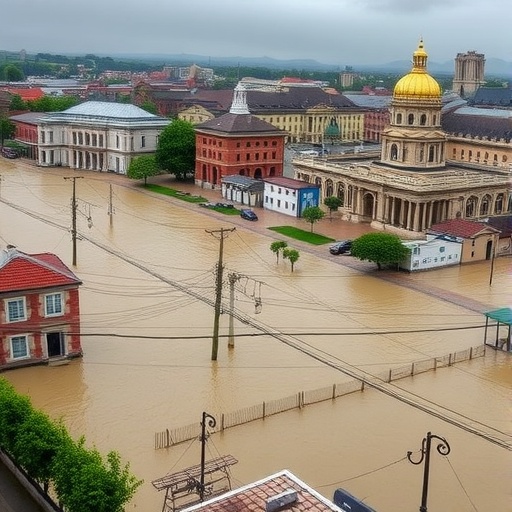In recent years, the increasing frequency and severity of flooding events worldwide have underscored the urgent need to understand the factors that influence the human toll such disasters exact. A groundbreaking study published in Nature Communications offers a compelling perspective on this issue, revealing that political development plays a significant role in predicting reductions in the human cost of flooding. This new research pivots away from the typical focus solely on environmental or technological variables, placing political structures and their evolution at the heart of disaster impact mitigation.
The global rise in flooding incidents due to climate change and urban expansion has catalyzed scientific inquiry into not just the physical causes of floods but also the societal vulnerabilities that exacerbate their impact. Traditionally, research has emphasized infrastructural resilience and emergency management strategies. However, this study illuminates the profound influence that political development—specifically the maturation of political institutions and governance quality—exerts on a society’s capacity to reduce flood-related mortality and injury.
To delve into this complex relationship, the authors employed sophisticated comparative political analyses combined with extensive flood event data from across the world. Their methodological framework integrated metrics of political development—including measures of government effectiveness, accountability, and rule of law—with detailed records of flood occurrences and associated human costs. This multifaceted approach allowed for a nuanced assessment of how variations in political context influence outcomes following flood disasters.
One of the pivotal findings of the study is the quantifiable correlation between high levels of political development and reduced fatalities from flooding events. Countries characterized by strong democratic institutions, transparency, and robust governance mechanisms tend to mobilize resources more effectively and implement preemptive measures that mitigate flood impacts. In contrast, states with weaker political frameworks often struggle with coordination and resource allocation, resulting in higher casualty rates.
The researchers also explored how political development interacts with economic factors. While economic wealth is undeniably important for infrastructure and emergency response capabilities, the study emphasizes that political maturity often outperforms economic status in reducing human flood costs. This suggests that even comparatively less affluent but politically stable nations can significantly lower their flood mortality through effective governance and policy implementation.
Moreover, the study brings to light the mechanisms through which political development translates into tangible flood resilience. Effective political institutions enable better land use planning, enforce building codes, and ensure inclusive disaster risk management policies. Democratic accountability compels governments to prioritize citizen safety, particularly in vulnerable communities that might otherwise be neglected in autocratic regimes. This institutional responsiveness forms a crucial buffer against the destructive potential of floods.
The implications of these findings are profound for international development and humanitarian policy. There is a clear imperative to integrate political development strategies with climate adaptation initiatives. By fostering governance reforms and democratic consolidation, international agencies and local governments can create enabling environments that not only strengthen disaster preparedness but also build long-term social resilience.
This research also challenges the prevailing notion that investments in physical infrastructure alone suffice for flood disaster mitigation. Instead, it advocates for a more holistic approach that simultaneously addresses political, economic, and social dimensions of vulnerability. Importantly, it underscores the necessity for interdisciplinary collaborations among climatologists, political scientists, urban planners, and emergency response experts.
In addressing future challenges posed by climate change, the insights from this study serve as a clarion call for policymakers to recognize political development as a cornerstone of disaster risk reduction frameworks. Enhancing political institutions and governance practices can significantly diminish the human cost of floods, particularly as extreme weather events become more frequent and severe under global warming scenarios.
Of particular note is the geographic distribution analyzed in the study, which covers diverse political systems and economic contexts. This comprehensive scope reinforces the universal applicability of the findings, demonstrating that political development’s protective effects transcend regional and cultural boundaries. It also offers a roadmap for nations at varying stages of development to leverage political growth as a tool for disaster risk management.
The technical rigor of the study stems from its use of longitudinal data analysis and mixed-methods modeling, which control for confounding variables and isolate the effect of political factors on flood mortality rates. By statistically validating the causative link between governance indicators and human outcomes, the authors provide a robust empirical foundation for policy recommendations that prioritize political reforms alongside infrastructural investments.
This study’s contribution is not limited to academia; it has pragmatic dimensions for disaster response practitioners. The insights emphasize training government officials in transparent and accountable decision-making, boosting civil society’s role in monitoring and advocating disaster preparedness, and encouraging participatory governance models that keep vulnerable populations at the forefront of planning processes.
In conclusion, this research marks a significant advancement in understanding how political development shapes the human cost of flooding disasters. It reorients disaster risk discourse toward a governance-centered approach, offering a powerful framework that integrates political science with climate resilience science. As flooding risks escalate globally, the strategic enhancement of political institutions carries the promise of saving countless lives and fostering more resilient societies worldwide.
Subject of Research: The study investigates the influence of political development on the human costs associated with flooding disasters, analyzing how governance quality and political maturity predict reductions in flood-related fatalities and injuries.
Article Title: Political development predicts reduced human cost of flooding
Article References:
Vesco, P., von Uexkull, N., Vestby, J. et al. Political development predicts reduced human cost of flooding. Nat Commun 16, 10128 (2025). https://doi.org/10.1038/s41467-025-65914-6
Image Credits: AI Generated
DOI: https://doi.org/10.1038/s41467-025-65914-6
Tags: climate change and flooding frequencycomparative political analysis of floodingemergency management and governanceenvironmental factors and political influence on disastersgovernance quality and disaster mitigationhuman cost of natural disastersinfrastructure resilience in flood-prone areaspolitical development and flooding impactpolitical institutions and disaster responsepolitical structures and human safetyreducing flood-related mortality through governancesocietal vulnerabilities to flooding





